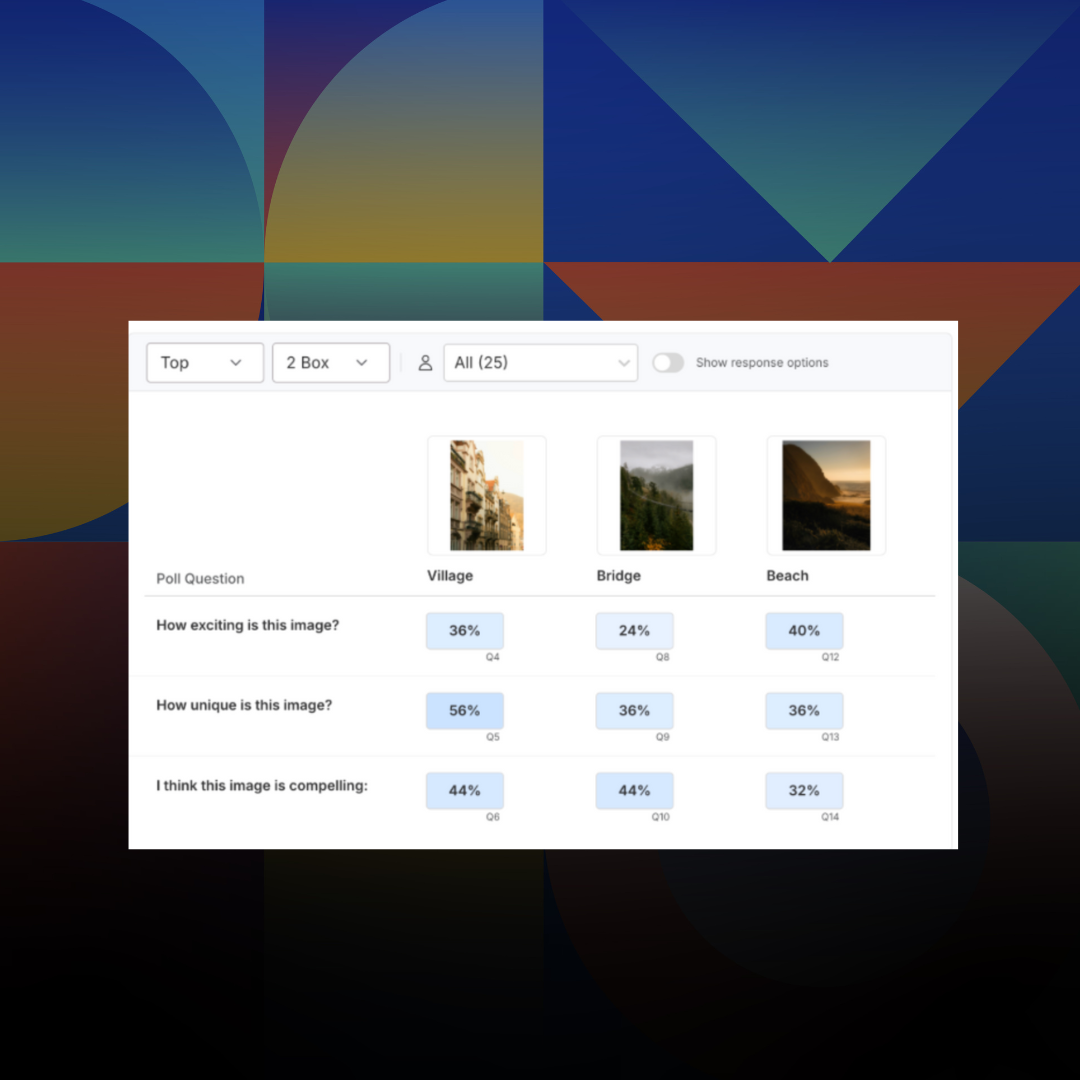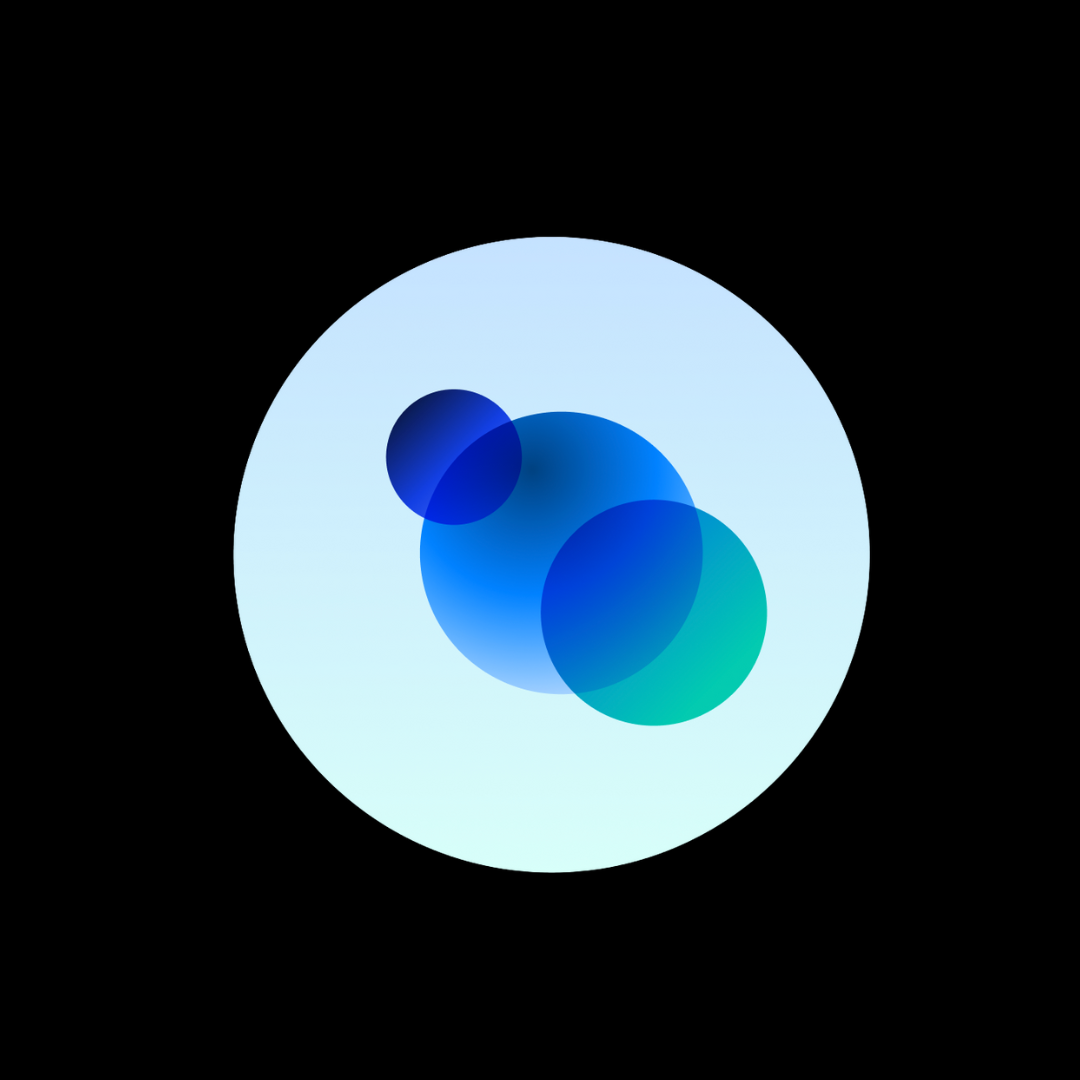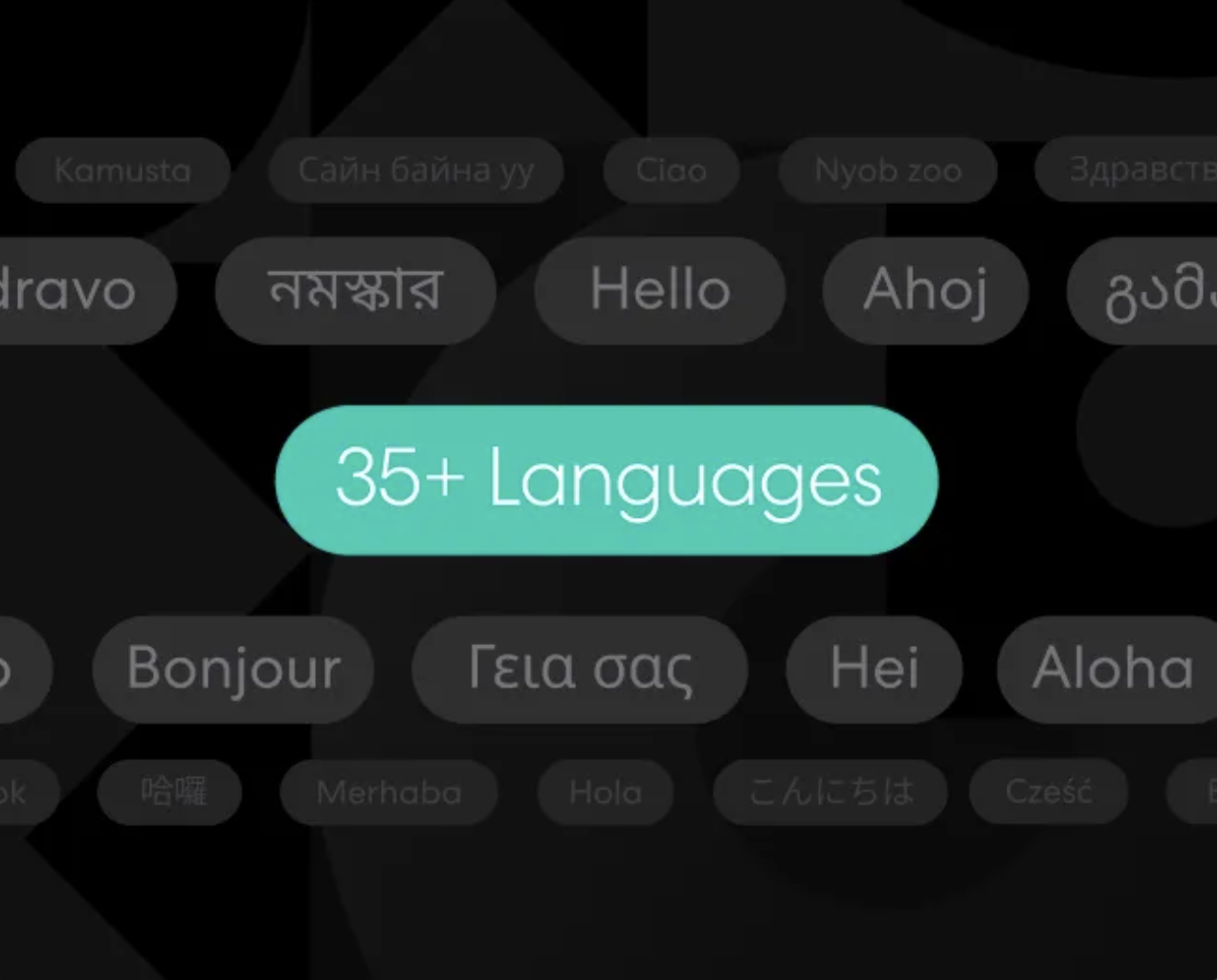.jpg)
Advanced Research
9 Essential Questions for Evaluating Employee Satisfaction Software
February 20, 2026
Employee Research
Articles
.jpg)
Advanced Research
9 Essential Questions for Evaluating Employee Satisfaction Software
February 20, 2026
Employee Research
Articles

Advanced Research
How to Evaluate Market Research Vendors for Global Reach
Team Remesh
February 10, 2026
Market Research
Articles

Advanced Research
How to Evaluate Market Research Vendors for Global Reach
Team Remesh
February 10, 2026
Market Research
Articles

Advanced Research
3 Early-Stage Research Methods to Gather Consumer Insights
Team Remesh
January 27, 2026
Market Research
Articles

Advanced Research
3 Early-Stage Research Methods to Gather Consumer Insights
Team Remesh
January 27, 2026
Market Research
Articles
.avif)
Advanced Research
Why Agencies Should Embrace AI Tools for Market Research
Team Remesh
January 26, 2026
Articles
.avif)
Advanced Research
Why Agencies Should Embrace AI Tools for Market Research
Team Remesh
January 26, 2026
Articles

Advanced Research
The Top Market Research Companies for the CPG Industry
Team Remesh
January 20, 2026
Market Research
Articles

Advanced Research
The Top Market Research Companies for the CPG Industry
Team Remesh
January 20, 2026
Market Research
Articles

Advanced Research
The Most Cutting-Edge Consumer Insights Software of 2026
Team Remesh
January 5, 2026
Market Research
Articles

Advanced Research
The Most Cutting-Edge Consumer Insights Software of 2026
Team Remesh
January 5, 2026
Market Research
Articles

Research 101
Introducing: Poll Comparison - Streamline Concept Testing and Make Better Decisions Faster
Emmet Hennessy
November 24, 2025
Market Research
Articles

Research 101
Introducing: Poll Comparison - Streamline Concept Testing and Make Better Decisions Faster
Emmet Hennessy
November 24, 2025
Market Research
Articles

AI
Purpose-Built for Research AI is Here - a Letter from the CPO
Jessica Dubin
October 21, 2025
Market Research
Articles

AI
Purpose-Built for Research AI is Here - a Letter from the CPO
Jessica Dubin
October 21, 2025
Market Research
Articles

Advanced Research
Unlock Agile Global Insights: Using Remesh Multi-Language Conversations for Research Across Audiences
Customer Success Team
October 14, 2025
Market Research
Articles

Advanced Research
Unlock Agile Global Insights: Using Remesh Multi-Language Conversations for Research Across Audiences
Customer Success Team
October 14, 2025
Market Research
Articles
Online Focus Groups vs Traditional Focus Groups
Online focus groups have become a popular alternative to the traditional focus group. What are the pros and cons of both?



Differences between traditional and online focus groups
Focus groups are no exception in today's world of digitalization.
It’s not uncommon to see a family sitting at a restaurant all on their phones. Or a train full of quietly zoned-out commuters noodling away on their devices.
It’s easy to dismiss these changes as the end of an era when we willingly made eye contact. But, this type of tuned-in and digital environment can improve conducting research - from writing a discussion guide to running a DIY focus group. It can also fundamentally change the way a brand uses a small group.
Read: Advanced Discussion Guide Writing (eBook)

Introduction to Online Focus Groups
Of course, there are valid concerns about replacing IRL with an online exchange. And not just that future generations will forget how to human properly without a phone in hand.
There are pros and cons to exchanging your traditional research methods for alternative discussion avenues.
More innovative customer interview strategies can include things like online focus groups. The latter has become a cost-efficient and quicker alternative to the in-person group, even non-virtual products, and services.
Whether you’re eager to jump on the online train (choo-choo! 🚂) or very doubtful that the online version can bring reliable results, it’s worth first pondering both sides.

How Do Online Focus Groups Work, Anyway?
To arrange a focus group, begin by:
- establishing your topic
- defining objectives
- writing a list of targeted customers
- build group discussion guide
Then, hire a moderator (internally or from a qual research company) who will write the discussion guide and lead the group. The moderator should prepare for on-the-fly questions.
Following this method will provide you with the strongest qualitative data and various customer feedback, including thoughts, feelings, and beliefs.
If you're still not clear on how this research works online, watch the video of our own online focus group research platform below. In this conversation, participants discuss concept testing.

Focus Group vs. In-Depth Interview
A focus group is fundamentally an interaction of individuals (namely the moderator and the participants) that moderators drive to gain information about a specific research topic. Moderators also conduct In-depth interviews on an individual level between a single interviewer and a single individual or consumer. The choice depends on the research type.
Before proceeding to the pros and cons list, determine the exact objective of your market research. If your goal is to scale responses, an online focus group might be the right option. If your goal is to test something that requires interaction - like user experience - then an in-depth interview makes more sense.
Read: Digital Transformation Trends at Work (Report)

Online Focus Groups Cons
Avoiding common market research blunders is often a challenge, even for the most seasoned researcher. By weighing the pros and cons, avoiding those mistakes will be easier.

Difficult to Observe Body Language
With a chat-style interface, you can cultivate thought-provoking responses. But, you don’t get to see the same body language and facial expressions as in face-to-face focus groups. In an online forum, a participant might be confident in their response. However, they may not communicate well in writing.
Both scenarios could occur with online focus group studies. But, subtle hints or gestures may be missed. Additionally, product testing may go amiss if the product involves physical interaction. Product testing error is unlikely, though, since customers increasingly purchase products online without ever seeing them in person.

Lack of Group Member Dynamics Limits Discussion
One benefit of an in-person focus group is generating customer insights through interaction. In an online setting, this may not happen. So, it's important to consider if this online qualitative social research element will be important for you.

Badly-Worded Questions Dilute The Digital Interview
When market research focus groups occur in person, it’s easier to tell if participants don’t quite understand a question. Even if they're don't explicitly state that.
With an online research platform, it might not be apparent that people are confused. Potentially, this makes the data for that question invalid.
Asking Questions In Group Settings
When you’re working with many people, there isn’t much room for specific questions. As with any focus group, you should do work beforehand to:
- ensure open-ended discussion questions are clear and simple
- that engagement is scaleable

Online Focus Groups Can Discourage Engaged Discussion
It’s easier for a participant to lose focus in research via a laptop. To remedy this, use a highly engaging platform. Notably, online surveys and social media feedback don’t typically garner high engagement.
If all goes according to plan, in this case, your user interviews or participant polling should yield rich data.

Online Focus Groups Pros

Anonymous Participant Responses → Better Insights
Nothing loosens tongues like the ability to be anonymous.
As intimate and comfortable as an in-person focus group can seem, social norms still apply. Removing the social constructs that exist in person allows people to feel comfortable enough to speak their minds and share their opinions.
Ultimately, this gives you more honest responses and cleaner, more precise data.

Diversity Is Easier To Obtain Through Qualitative Market Research
Sure, in-person focus groups can allow for a diverse group of people or segments. But, online focus groups are more flexible in location and time commitment. Since all that's needed to join is an internet connection, people can participate in focus groups globally. And now it’s even possible to participate in focus groups where participants speak different languages.
Busy schedules often stop people from being able to participate in traditional research methods. But, with no location restrictions, you can get a wider sampling of the region or country you're targeting.
Moreover, conducting focus groups across multiple languages further enhances the diversity of your qualitative market research. With Remesh's Multi-Language Conversations feature, you can now engage with participants from various linguistic backgrounds simultaneously. This allows you to gather insights from a broader range of consumers, regardless of their native language, giving you a more comprehensive understanding of your target market.
By breaking down language barriers, you can tap into previously unexplored market segments and gain fresh perspectives on your products or services. This is particularly valuable for companies looking to expand their global presence or improve their cross-cultural communication strategies. Conducting focus groups in multiple languages ensures that you capture the nuances and cultural differences that may impact consumer preferences and behaviors.
Furthermore, multi-language focus groups can help you identify potential localization issues early in the research process. By engaging with participants in their native language, you can better understand how your messaging, branding, or product features are perceived across different cultures. This allows you to make informed decisions about adapting your offerings to suit specific markets, ultimately increasing your chances of success in global expansion efforts.
In addition to the benefits of increased diversity, conducting focus groups across multiple languages can also lead to more accurate and authentic insights. When participants are able to express themselves in their preferred language, they are more likely to provide detailed and nuanced responses. This can result in richer, more meaningful qualitative data that accurately reflects the thoughts and feelings of your target audience.
Leveraging tools like Remesh's Multi-Language Conversations feature not only makes global qualitative market research more accessible but also streamlines the process of analyzing and interpreting data from multiple languages. With automated translations and a unified set of data in your preferred language, you can quickly identify patterns, themes, and key insights without the need for extensive manual translation work.

Cost-Efficient Research Method
When you remove physical limitations, it can become much easier to organize and conduct a focus group, even with limited resources.
A digital focus group can also be useful when connecting with a demographic group that's hard to reach. You don’t need to reserve and pay for space. Instead, your sample can concentrate on answering questions that you've carefully crafted.


Faster Than Traditional Market Research Studies
This speed goes hand in hand with saving money — time is money, after all, am I right? When you don’t need to book a space and coordinate travel with participants, you save time and energy. These benefits are incredibly impactful when you are carrying out multiple sessions over some time.
As a bonus, paid online studies are typically less expensive than in-person research studies because the session is less demanding. This structure also allows participants who engage in qualitative research as a side hustle to engage in volume.

Traditional Focus Groups Are Outdated Research Methods
A benefit of using an online research platform is the digital technology used to run the discussion. New tech can increase efficiency, lower costs, and give deeper insights than you would glean from an in-person group.
Some online research platforms (or services from market research companies) can engage hundreds of participants at once. This engagement scale allows you to converse and ask questions the way you would in a physical setting and combines the best of both worlds: quantitative research supported with qualitative insights directly from your customer.
You can implement artificial intelligence and machine learning in this style of market research. Here, customers can be segmented and analyzed in a large number of incoming responses. In your research, these technologies can:
- pinpoint the best responses that represent the group
- reveal crucial data points that inform business decisions
Read: The Ultimate Guide to Conducting Online Qualitative Research

Where To Find Digital Sample
Because this research method may be new to your brand, it’s important to think about the potential consequences. These consequences include finding samples.
There are many unique ways to find participants. The traditional sample size is around 10 participants. However, online focus group platforms can handle 50 to 250 participants and beyond. This method may also extend the time of research beyond one hour.
Another non-traditional concern to take on is the way that focus groups pay participants. While paper gift cards might suffice in a traditional focus group, they don’t translate well to anonymous digital participants. Instead, streamline the user experience for digital samples by providing Venmo links, coupon codes, or even something as unusual as Bitcoin!

Focus Group Recruitment Strategies
Suppose your brand feels uneasy about conducting paid research on the Internet. One way to ease this research anxiety is to partner with a vendor. They can handle the payment process instead.
In terms of finding samples, there are several new strategies starting to emerge:
- Facebook Page Recruitment
- Using Facebook ads to recruit participants
- Synthetic Sample
- A panel made up of both real human participants and past participant data
- Online Panel (or Maintained Panel)
- An in-house community maintained for use in research purposes
And finally, when you start to recruit for focus groups online, make sure to calculate the sample size you need by using a simple formula, which the in-house researchers at Remesh rely on as well.

Continuing Your Market Research Studies
Before you make any final research method decisions, make sure you understand what kind of data to collect. Consider how important things like the number of responses are to the end result you are trying to achieve. That way, you can see if there is a particular research method that best aligns with your goals.
Eager to better understand your customers? Check out our eBook on writing a discussion guide for deeper, more meaningful insights.
-
Lorem ipsum dolor sit amet, consectetur adipiscing elit. Suspendisse varius enim in eros elementum tristique. Duis cursus, mi quis viverra ornare, eros dolor interdum nulla, ut commodo diam libero vitae erat. Aenean faucibus nibh et justo cursus id rutrum lorem imperdiet. Nunc ut sem vitae risus tristique posuere.
-
Lorem ipsum dolor sit amet, consectetur adipiscing elit. Suspendisse varius enim in eros elementum tristique. Duis cursus, mi quis viverra ornare, eros dolor interdum nulla, ut commodo diam libero vitae erat. Aenean faucibus nibh et justo cursus id rutrum lorem imperdiet. Nunc ut sem vitae risus tristique posuere.
-
More
.jpg)


Stay up-to date.
Stay ahead of the curve. Get it all. Or get what suits you. Our 101 material is great if you’re used to working with an agency. Are you a seasoned pro? Sign up to receive just our advanced materials.

.png)

.png)

.png)
.png)





